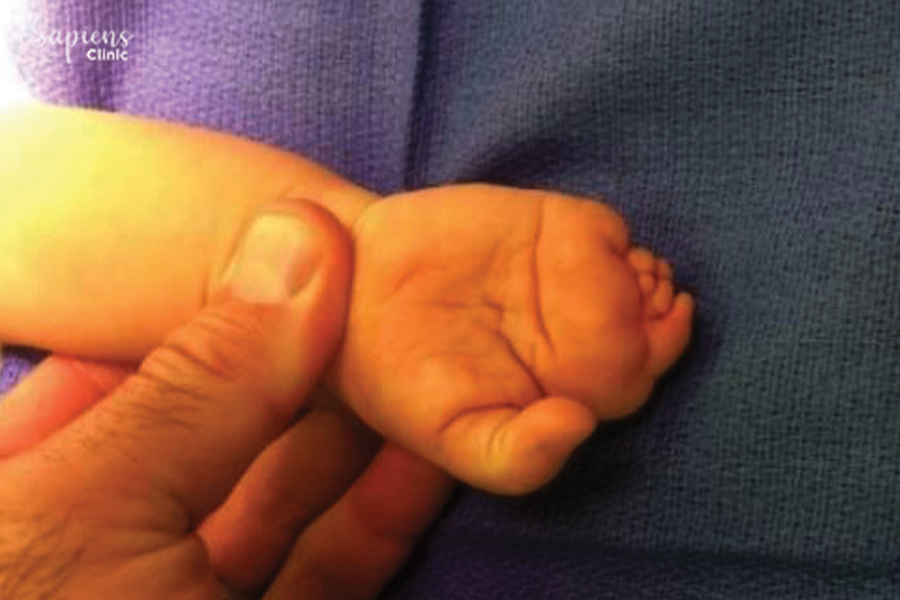Birth Defects Diagnosis and Treatment in Malleshwaram
Birth defects, also known as congenital anomalies, are structural or functional abnormalities present at birth that can affect various parts of the body, including the heart, brain, limbs, and internal organs. These conditions can range from mild to severe and may impact a child’s health, development, and quality of life. At Sapiens Clinic in Malleshwaram, we offer comprehensive evaluation, diagnosis, and management of birth defects to ensure the best possible outcomes for affected children and their families.
Understanding Birth Defects
Birth defects can be classified into several categories :
- Structural Defects: Physical abnormalities such as cleft lip/palate, heart defects, spina bifida, and limb malformations.
- Functional or Developmental Defects: Problems with how a body part or system works, including intellectual disabilities, sensory issues, and metabolic disorders.
- Chromosomal Abnormalities: Conditions like Down syndrome and Edwards syndrome resulting from changes in chromosome number or structure.
These defects can result from genetic factors, environmental exposures, or a combination of both.
Causes and Risk Factors
The exact cause of many birth defects is often unknown, but several factors may increase the risk :
- Genetic Factors: Inherited conditions or mutations.
- Environmental Exposures: Contact with certain medications, chemicals, or infections during pregnancy.
- Nutritional Deficiencies: Lack of essential nutrients like folic acid.
- Maternal Health Conditions: Diseases such as diabetes or obesity.
- Lifestyle Factors: Smoking, alcohol consumption, and drug use during pregnancy.
Common Types of Birth Defects
Some prevalent birth defects include :
- Congenital Heart Defects: Abnormalities in the heart’s structure affecting blood flow.
- Neural Tube Defects: Conditions like spina bifida and anencephaly resulting from incomplete development of the brain and spinal cord.
- Cleft Lip and Palate: Openings or splits in the upper lip and/or roof of the mouth.
- Limb Abnormalities: Missing or malformed limbs.
- Down Syndrome: A genetic disorder caused by an extra chromosome 21.
Diagnosis
Early detection of birth defects is crucial for effective management. Diagnostic methods include :
- Prenatal Screening: Ultrasounds and blood tests during pregnancy to assess the risk of certain conditions.
- Diagnostic Tests: Procedures like amniocentesis or chorionic villus sampling (CVS) to detect genetic abnormalities.
- Newborn Screening: Tests performed shortly after birth to identify metabolic or genetic disorders.
- Imaging Studies: MRI, CT scans, or echocardiograms to visualize structural anomalies.
Treatment Options
Management of birth defects depends on the type and severity of the condition :
- Surgical Interventions: Corrective surgeries for structural defects like heart anomalies or cleft palate.
- Medical Therapies: Medications to manage symptoms or prevent complications.
- Therapies and Rehabilitation: Physical, occupational, and speech therapies to support development.
- Nutritional Support: Dietary plans and supplements for metabolic disorders.
- Genetic Counseling: Guidance for families regarding inheritance patterns and future pregnancies.
Prevention Strategies
While not all birth defects can be prevented, certain measures can reduce the risk :
- Prenatal Care: Regular check-ups and screenings during pregnancy.
- Healthy Lifestyle: Avoiding harmful substances and maintaining a balanced diet.
- Folic Acid Supplementation: Taking folic acid before and during early pregnancy to prevent neural tube defects.
- Vaccinations: Protecting against infections like rubella that can cause birth defects.
- Managing Chronic Conditions: Controlling diseases like diabetes prior to conception.
Conclusion
Birth defects can pose significant challenges, but with early diagnosis and appropriate management, many children lead healthy, fulfilling lives. If you have concerns about birth defects or are seeking expert care, consult Dr. Darshan Kumar A. Jain, Orthopedic Specialist at Sapiens Clinic, Malleshwaram, for comprehensive evaluation and personalized treatment plans.
FAQs
1. Can all birth defects be detected before birth?
Not all birth defects are detectable prenatally, but many can be identified through screening and diagnostic tests during pregnancy.
2. Are birth defects always hereditary?
While some birth defects have a genetic component, others result from environmental factors or a combination of both.
3. How common are birth defects?
Birth defects occur in approximately 1 in every 33 infants, varying by region and population.
4. Is it possible to prevent birth defects?
While not all birth defects can be prevented, risk can be reduced through proper prenatal care, healthy lifestyle choices, and nutritional supplementation.
5. What support is available for families of children with birth defects?
Support includes medical care, therapy services, educational resources, and counseling to assist families in managing their child’s condition.

Leave a Reply